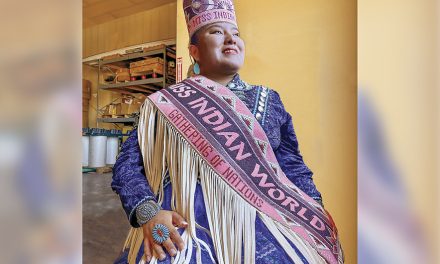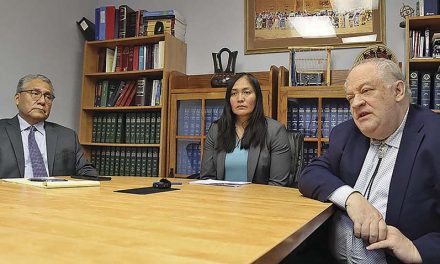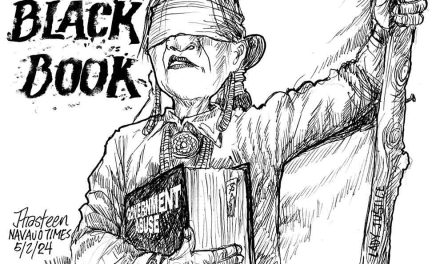
Capital Briefs | Damon: Council supports Hydrogen Hub act
WINDOW ROCK
Speaker Seth Damon last week said the Navajo Nation Council fully supports the Hydrogen Hub Development Act, which is under consideration by the New Mexico Legislature.
Damon joined a roundtable with New Mexico Environment Department Secretary James Kenney, Indian Affairs Secretary Lynn Trujillo, Economic Development Secretary Alicia Keyes, and representatives of Gov. Michelle Lujan Grisham.
Damon said, “We fully support the Hydrogen Hub Development Act that will serve as a catalyst for the development of an emerging hydrogen economy for the Four Corners region.”
But based on past experiences with energy development on Navajo lands, local Diné oppose the project and have said old uranium and coal mines should be reclaimed first before beginning new ventures.
Damon has been working with the Navajo Nation Oil and Gas Company to seek new revenue through development of Navajo hydrogen sources around Sanostee, N.M.
His proposal again faces local opposition.
In a letter to state lawmakers this week, the Navajo Nation Council requested a tribal seat on the proposed 11-member Hydrogen Hub Development Board, which would oversee any proposed public-private partnership agreements for hydrogen projects in New Mexico.
‘Uncontrolled spread’ of virus warning sent to 64 chapters
WINDOW ROCK – Based on the number of COVID-19 cases from Jan. 28 to Feb. 10, the Navajo Department of Health issued a health advisory notice to 64 of the 110 chapters warning of the uncontrolled spread of the coronavirus.
These chapters include Aneth, Baca/Prewitt, Beclabito, Black Mesa, Bread Springs, Casamero Lake, Chichiltah, Chilchinbeto, Chinle, Church Rock, Coppermine, Cove, Coyote Canyon, Crownpoint,
Dennehotso, Ganado, Houck, Kaibeto, Kayenta, Luepp, Little Water, Low Mountain, Lukachukai, Lupton, Manuelito, Many Farms, Nageezi, Nahatadziil, Nahodishgish, Naschitti, Nazlini, Newcomb,
Oaksprings, Pinedale, Pinon, Pueblo Pintado, Ramah, Red Valley, Rock Point, Rock Springs, Rough Rock, Round Rock, Sheepsprings, Shiprock, Shonto, Smith Lake, St. Michaels, Sweetwater,
Tachee/Blue Gap, Teecnospos, Teesto, Thoreau, To’hajiilee, Tohatchi, Tonalea, Torreon, Tsaile/Wheatfields, Tsayatoh, Tselani/Cottonwood, Tuba City, Twin Lakes,
Two Grey Hills, Upper Fruitland, and Whippoorwill.
Nation, Coconino Co. sign road projects MOU
FLAGSTAFF —The Navajo Nation and the Coconino County Board of Supervisors on Feb. 11 signed a five-year memorandum of understanding to work together on road maintenance, repairs, and other transportation initiatives, the president’s office reported.
There are over 1,700 miles of dirt and paved roadways within Coconino County and the Nation. The MOU establishes a workgroup to carry out objectives, including planning, repairing, and improving school bus routes.
Lena Fowler, the vice-chair of the Coconino County board, said, “The signing of this agreement allows the county to continue to improve 286 miles of school bus routes, which are the main roads on Western Navajo.”
Matt Ryan, chairman of the board, said, “Roads get our children to school, our families together with their elders, and connects to the market and jobs. This MOU will allow Coconino County to continue advancing important transportation projects with the Navajo Nation and promote continued collaboration between our governments.”
President Jonathan Nez said, “This partnership is crucial to leverage funding and resources to improve and maintain roadways on the Navajo Nation, within Coconino County.”
Joining Nez were other county officials and Navajo Nation Council delegates.
BIA begins correctional program reforms
WASHINGTON – The Bureau of Indian Affairs on Monday announced a series of reforms to the Office of Justice Services Correctional Program to protect the rights, dignity, and safety of those in custody.
After reports about the treatment of incarcerated individuals, including 16 inmate deaths between 2016 and 2020, the BIA launched a three-month review in the fall of 2021.
The review included current conditions in BIA-operated and -funded detention facilities. There are 96 corrections programs funded by the BIA, 26 operated by the BIA, and 70 used by tribes.
Bryan Newland, assistant secretary for Indian Affairs, said, “We will not shy away from acknowledging the past and taking ownership of the path to improve conditions in our facilities.”
The report assessed the thoroughness and effectiveness of the 16 closed in-custody investigations, if the BIA’s current in-custody death investigation reporting meets modern standards, whether the incident investigations met common industry standards for proper evaluation, and whether investigators have proper training and skills to effectively investigate in-custody death incidents.
Consistent with the findings of the bureau’s review, BIA is moving forward with more than two dozen reforms focused on:
• Updating policies and implementing consistent standards across corrections facilities.
• Improving the recruitment, retention, training, and morale of staff; and
• Improving interagency coordination with federal partners to ensure safety for inmates and accountability for correctional officers.
U.S. to give $1.6M for Navajo abandoned mine cleanup
WINDOW ROCK – The U.S. Department of the Interior will allocate $725 million in FY22 to safeguard and reclaim abandoned coal mines throughout the United States.
The New Mexico portion is $2.423 million. In total, $11.3 billion will be provided to 22 states and the Navajo Nation over 15 years.
The Navajo Nation is the only tribal nation to be included with the states and will receive $1.6 million over 15 years for reclamation.
The Navajo Nation currently has four coal mines, including Black Mesa Mine, Peabody Kayenta Mine, and McKinley Mine, under reclamation.
The AML reclamation projects will close dangerous mine shafts, reclaim unstable slopes, improve water quality, and restore water supplies damaged by mining.
Melvin Yazzie, the principal mining engineer for Navajo Nation Abandoned Mine Lands Reclamation Department, said, “The Navajo Nation’s Abandoned Mine Lands Reclamation Department and the Navajo Nation Division of Natural Resources are grateful that the 2022 Bipartisan Infrastructure Law will be providing funding to the Navajo Nation through the AML Reclamation.”
“With the dwindling AML funds, this will be an economic stimulus for the Navajo Nation,” he said.
Officials explore expanding telecommunications for first responders
WINDOW ROCK – On Feb. 8 at To’hajiilee, a company demonstrated technology that uses satellites for mobile cell sites that enable first responders in remote areas to connect through telecommunications, the president’s office reports.
FirstNet, with AT&T, is a public-private partnership with the First Responder Network Authority, an independent agency within the U.S. Department of Commerce. The authority is charged with building, deploying, and operating a nationwide broadband network that equips first responders to save lives and protect communities.
This was the first official visit by FirstNet board members, including Chairman Stephen Benjamin and Vice Chairman Richard Carrizzo.
At the onset of the COVID-19 pandemic, the Navajo Telecommunication Commission worked with FirstNet to deploy two satellite mobile units to provide telecommunications for first responders and FEMA officials.
Christopher Becenti, the Navajo Telecommunications office director, said, “We look forward to the initial deployment throughout the Navajo Nation. This will give us an idea where to focus on reinvestment to provide even more coverage throughout the Navajo Nation.”
Return on insurance totals $3.3M
WINDOW ROCK – On Feb. 10, the Navajo Nation announced a return on insurance coverage of $3.3 million at a meeting with CKP Insurance in Phoenix, the president’s office reported.
The Nation’s Department of Agriculture applied for the insurance coverage through the U.S. Department of Agriculture’s Pasture, Rangeland, Forage Insurance Program. In 2016, the Síhasin Fund Pasture Rangeland and Forage Expenditure Plan reserved $20 million for insurance premiums to the USDA.
This latest return helps pay for Agriculture Infrastructure Fund Programs administered by the Department of Agriculture and Division of Community Development. The program supports Navajo livestock owners, farmers, and agriculture users.
The programs include the Agriculture Conservation Corps, Livestock Management, Livestock Management Incentive, and the Farm and Garden Incentive.
Information: https://www.agriculture.navajo-nsn.gov/# or928-871-6605.
Check your voter registration status
WINDOW ROCK — The Navajo Election Administration informs the public that Election 2022 is upon us once again.
Check your voter registration status and see if you’re still active in the voting system. Contact your agency office to check your status. If your status is active, you’re ready to vote.
If your status is inactive, you need to reactivate your registration status by contacting the registrars at your chapter or contacting your home agency office. All updates need to be done in person. You will need three of the following identification documents:
• Certificate of Indian Blood
• Valid state driver’s license, state ID card, or tribal ID card.
• Social Security card
Agency election offices and contact information are below.
• Western Navajo Agency: 928-283-3220.
• Chinle Agency: 928-674-2551 or 928-674-2550.
• Fort Defiance Agency: 928-871-6881 or 928-871-7268.
• Northern Navajo Agency: 505-368-1331 or 505-368-1333.
• Eastern Navajo Agency: 505-786-2263 or 505-786-2083.
• Window Rock Central Office: 928-871-6367.








 Highway 264,
Highway 264, I-40, WB @ Winslow
I-40, WB @ Winslow